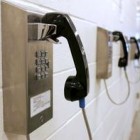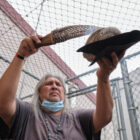
Nine years since it was first petitioned to do so by families of people behind bars, the Federal Communications Commission appears closer to imposing a limit on the soaring rates some prisoners have to pay to make interstate telephone calls. It won’t say when it will take action, however. The FCC’s consumer advisory committee submitted a list of recommendations last month urging the FCC to ensure that prices for phone calls from prison are kept to “reasonable” levels. And both the FCC Chairman Julius Genachowski and FCC Commissioner Mignon Clyburn have come out in support of limiting charges by private companies holding monopolies over prison telephone service in many states. The push to cap prison phone rates started when Martha Wright, a grandmother who could not afford to call her grandson when he was incarcerated, filed a petition in 2003 asking the FCC to take regulatory action.


